“Global Temperature Sensor Market to reach a market value of USD 11 Billion by 2030 growing at a CAGR of 6.1%”
The Global Temperature Sensor Market size is expected to reach $11 billion by 2030, rising at a market growth of 6.1% CAGR during the forecast period. In the year 2022, the market attained a volume of 1,10,852.4 thousand units, experiencing a growth of 5.6% (2019-2022).
Temperature sensors are deployed along pipelines to monitor the temperature of transported fluids. Deviations from optimal temperatures can indicate potential issues, such as blockages, leaks, or changes in fluid properties. Continuous monitoring helps prevent accidents and ensures safe oil and gas transport. Consequently, the real estate segment would generate approximately 17.15% share of the market by 2030. Gas processing plants use temperature sensors to monitor and control various stages of gas treatment, including separation, compression, and dehydration. Accurate temperature measurements are essential for optimizing these processes' efficiency and ensuring the processed gas's quality.
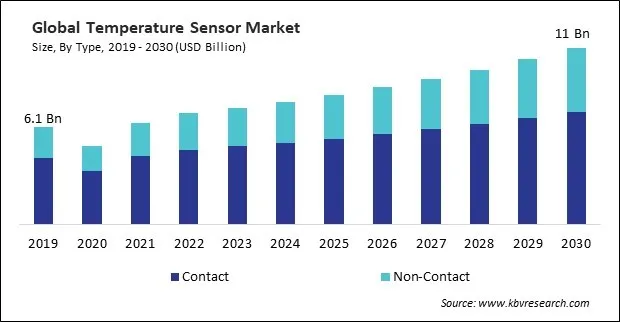
IoT-enabled smart home devices utilize temperature sensors for precise monitoring and control, including thermostats, climate control systems, and smart appliances. This contributes to home environments' energy efficiency, comfort, and user customization. Wearable health devices and medical IoT applications incorporate temperature sensors for monitoring body temperature and environmental conditions. This convergence has improved efficiency and accuracy in temperature monitoring and opened avenues for innovative applications and services, driving the positive growth of the market. Moreover, Temperature sensors are utilized to monitor the temperature of transmission fluids in automatic transmissions. This helps optimize shifting performance and ensures the longevity of transmission components. Temperature sensors are integrated into climate control systems in modern vehicles to monitor cabin temperatures. As automotive technologies evolve, the demand for temperature sensors is expected to grow further, contributing to the overall expansion of the market.
However, Industries that rely on temperature sensors for quality control, such as pharmaceuticals, food production, and semiconductor manufacturing, face challenges when sensors exhibit calibration drift. Inaccurate temperature readings can result in suboptimal product quality and increased production costs. Many industries are subject to strict regulatory standards that mandate precise temperature control and monitoring. This can lead to unexpected failures and costly repairs. Due to the above factors, market growth will be hampered in the coming years.
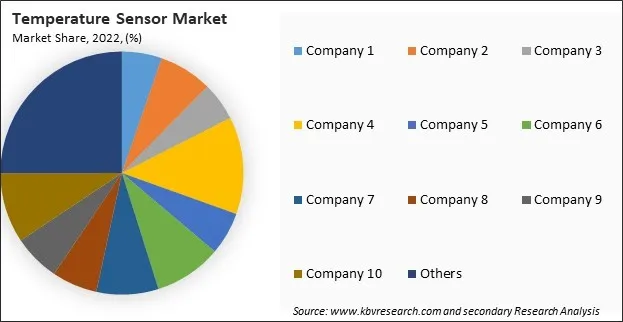
The leading players in the market are competing with diverse innovative offerings to remain competitive in the market. The above illustration shows the percentage of revenue shared by some of the leading companies in the market. The leading players of the market are adopting various strategies in order to cater demand coming from the different industries. The key developmental strategies in the market are Acquisitions, and Partnerships & Collaborations.
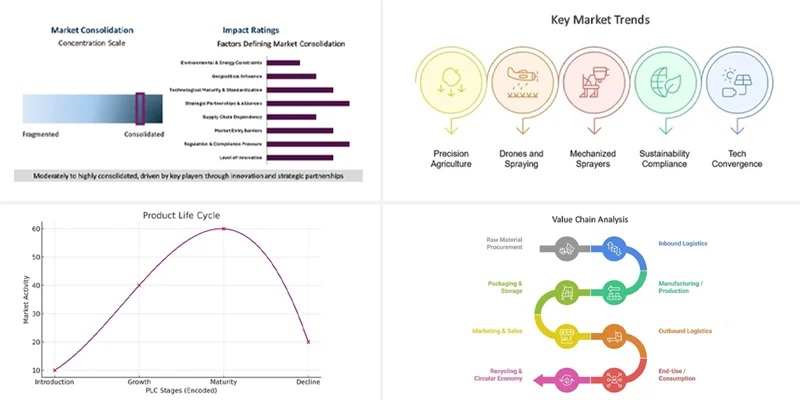

Under non-contact type, the market is further divided into infrared and others. In 2022, the infrared segment held the highest revenue share in the market. Infrared sensors allow for remote sensing, enabling temperature measurements from a distance. This is crucial in applications where access to the object is limited, or the object is in a hazardous environment. It is commonly used in industrial, medical, and research settings. Infrared sensors are capable of measuring the temperature of moving objects. This makes them suitable for applications where the target object is in motion, such as monitoring conveyors, rotating machinery, or inspecting fast-moving production lines. They often come in handheld or fixed-mount configurations, allowing users to measure temperatures quickly and conveniently without complex setups or calibration procedures.
Based on application, the market is fragmented into chemical, oil & gas, energy & power, healthcare, food & beverages, consumer electronics, automotive, aerospace & defense, metals & mining, and others. In 2022, the consumer electronics segment witnessed the largest revenue share in the market. Temperature sensors are used in laptops and computers to monitor the temperature of central processing units (CPUs), graphics processing units (GPUs), and other components. These sensors provide real-time temperature data, allowing the system to adjust fan speeds or initiate cooling efforts to prevent overheating and potential damage to internal components. Temperature sensors are essential components in smartphones and tablets. They help monitor the device's internal temperature and contribute to optimizing performance and battery life. Additionally, temperature sensors play a role in preventing devices from overheating during resource-intensive tasks, such as gaming or video streaming.
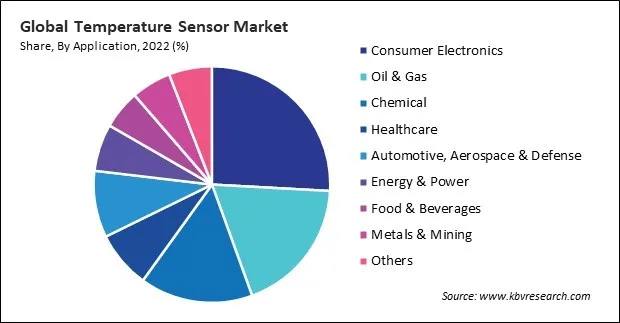
On the basis of type, the market is segmented into non-contact and contact. Non-contact sensors provide rapid temperature measurements, often in milliseconds. This quick response time is crucial in applications where real-time data is essential, such as industrial manufacturing processes, quality control, or research environments. Modern non-contact temperature sensors offer high accuracy and precision, making them suitable for applications that demand tight control over temperature variables. This includes applications in research, laboratories, and industries where temperature directly affects product quality.
Under contact type, the market is further classified into bimetallic temperature sensor, thermistor, resistive temperature detector, thermocouple, and others. In 2022, the thermocouple segment registered the highest revenue share in the market. Thermocouples provide a rapid response to changes in temperature. Their small mass and direct contact with the measurement surface allow for quick detection of temperature variations, making them suitable for real-time monitoring applications. Thermocouples are known for their robust construction, making them durable and capable of withstanding harsh environmental conditions. They are often used in industrial settings, including manufacturing, chemical processing, and metalworking.
Free Valuable Insights: Global Temperature Sensor Market size to reach USD 11 Billion by 2030
Region-wise, the market is analysed across North America, Europe, Asia Pacific, and LAMEA. The North America region garnered a significant revenue share in the market in 2022. Thermocouple temperature sensors, manufactured by regional firms including Emerson Electric Co., exhibit remarkable resistance and longevity when exposed to challenging process environments. Vernier Software and Technology, among others, provides thermocouple temperature sensors capable of quantifying temperatures spanning from -200oC to 1400oC. As more and more products incorporate the research and development of various types of temperature sensors and such developments occur in a variety of industries in the region, the market for temperature sensors is anticipated to expand at a healthy rate.
| Report Attribute | Details |
|---|---|
| Market size value in 2022 | USD 6.9 Billion |
| Market size forecast in 2030 | USD 11 Billion |
| Base Year | 2022 |
| Historical Period | 2019 to 2021 |
| Forecast Period | 2023 to 2030 |
| Revenue Growth Rate | CAGR of 6.1% from 2023 to 2030 |
| Quantitative Data | Volume in Thousand Units, Revenue in USD Billion, and CAGR from 2019 to 2030 |
| Number of Pages | 409 |
| Number of Tables | 800 |
| Report coverage | Market Trends, Revenue Estimation and Forecast, Segmentation Analysis, Regional and Country Breakdown, Market Share Analysis, Porter’s 5 Forces Analysis, Company Profiling, Companies Strategic Developments, SWOT Analysis, Winning Imperatives |
| Segments covered | Type, Application, Region |
| Country scope |
|
| Companies Included | ABB Group, Siemens AG, Emerson Electric Co., Honeywell International, Inc., Microchip Technology Incorporated, NXP Semiconductors N.V., Analog Devices, Inc., ON Semiconductor Corporation, TE Connectivity Ltd., Texas Instruments, Inc. |
By Type (Volume, Thousand Units, USD Billion, 2019-2030)
By Application (Volume, Thousand Units, USD Billion, 2019-2030)
By Geography (Volume, Thousand Units, USD Billion, 2019-2030)
This Market size is expected to reach $11 billion by 2030.
Increase in adoption in the automotive sector are driving the Market in coming years, however, Data security and privacy concerns restraints the growth of the Market.
ABB Group, Siemens AG, Emerson Electric Co., Honeywell International, Inc., Microchip Technology Incorporated, NXP Semiconductors N.V., Analog Devices, Inc., ON Semiconductor Corporation, TE Connectivity Ltd., Texas Instruments, Inc.ciences Corporation, Vivos Therapeutics, Inc, Open Airway Dental Solutions Australia Pty Ltd, Panthera Dental, Inc. (Panthera Sleep), Airway Management, Inc. and Ortho Solutions LC (DynaFlex)
In the year 2022, the market attained a volume of 1,10,852.4 thousand units, experiencing a growth of 5.6% (2019-2022).
The Contact segment is leading the Market by Type in 2022 thereby, achieving a market value of $7 billion by 2030.
The Asia Pacific region dominated the Market by Region in 2022 thereby, achieving a market value of $4.2 billion by 2030, growing at a CAGR of 6.5 % during the forecast period.
Our team of dedicated experts can provide you with attractive expansion opportunities for your business.
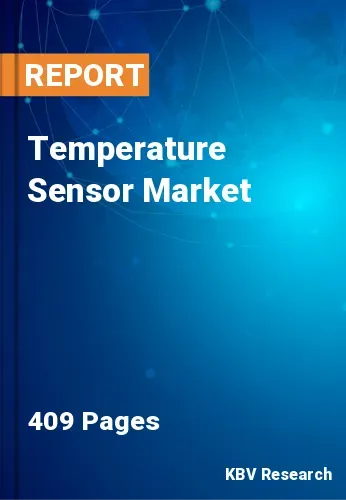
 Drivers
Drivers
 Restraints
Restraints
